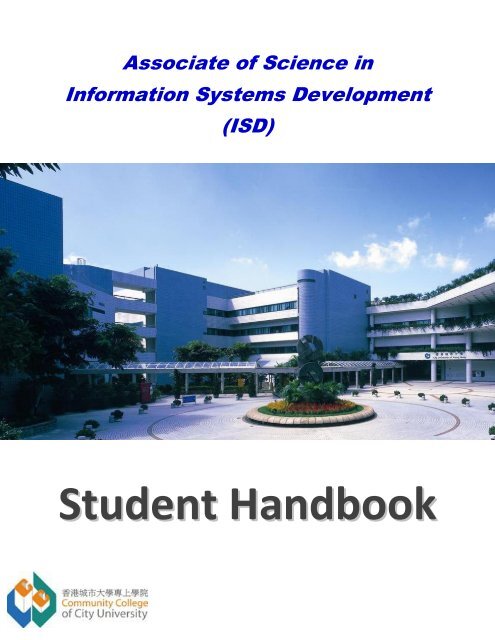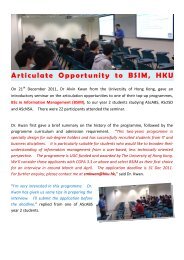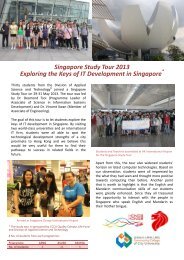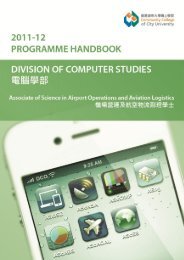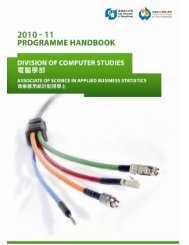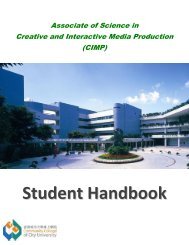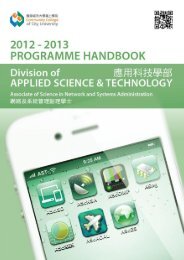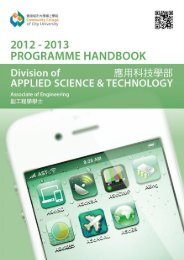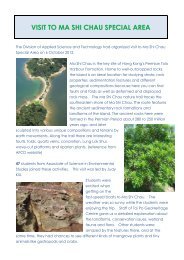S tudent H andbookk - Division of Applied Science and Technology
S tudent H andbookk - Division of Applied Science and Technology
S tudent H andbookk - Division of Applied Science and Technology
Create successful ePaper yourself
Turn your PDF publications into a flip-book with our unique Google optimized e-Paper software.
Associate <strong>of</strong> <strong>Science</strong> in<br />
Information Systems Development<br />
(ISD)<br />
S t u d e n t H a n d b o o k
CONTENTS<br />
Page<br />
1. Introduction 1<br />
2. Programme Entrance Requirements 3<br />
3. Aims <strong>and</strong> Objectives 5<br />
4. Programme Structure <strong>and</strong> Curriculum 7<br />
5. Keyword Syllabus for Courses 15<br />
6. Programme Requirements 22<br />
7. S<strong>tudent</strong> Charter 25<br />
8. Further Studies 31<br />
9. Staff List 32<br />
10. Academic Honesty <strong>and</strong> Research Ethics 37<br />
Academic Calendar<br />
Photos
Introduction<br />
This h<strong>and</strong>book provides you with important information you need for your<br />
specific programme. You should read it carefully <strong>and</strong> keep the h<strong>and</strong>book for<br />
reference throughout your time at CCCU.<br />
The Associate Degree programme you have chosen is one <strong>of</strong> the many high<br />
quality programmes being <strong>of</strong>fered by the Community College <strong>of</strong> City University,<br />
City University <strong>of</strong> Hong Kong.<br />
There are five academic units in the College, namely the <strong>Division</strong>s <strong>of</strong><br />
Commerce, Computer Studies, Language Studies <strong>and</strong> Social Studies, <strong>and</strong> the<br />
Centre for Lifelong Learning. Together they <strong>of</strong>fer a wide <strong>and</strong> exp<strong>and</strong>ing range<br />
<strong>of</strong> Associate Degree programmes <strong>and</strong> a PreAssociate Degree programme,<br />
<strong>and</strong> other shorter programmes for the benefit <strong>of</strong> the Hong Kong SAR <strong>and</strong> the<br />
wider region.<br />
The following Associate Degree programmes will be <strong>of</strong>fered in the 2007/08<br />
academic year:<br />
Offering Unit<br />
<strong>Division</strong> <strong>of</strong> Commerce<br />
Programme<br />
Associate <strong>of</strong> Business Administration<br />
(Accountancy)<br />
(China Business Management)<br />
(Electronic Commerce <strong>and</strong> Web <strong>Technology</strong>) *<br />
(Financial Services)<br />
(General Management)<br />
(Global Business)<br />
(Global Logistics <strong>and</strong> Trade Finance)<br />
(Human Resources Management)<br />
(Marketing)<br />
(with Communication Studies in<br />
English/Chinese)#<br />
AScISD Programme H<strong>and</strong>book 1
<strong>Division</strong> <strong>of</strong> Computer<br />
Studies<br />
Associate <strong>of</strong> Business Administration<br />
(Electronic Commerce <strong>and</strong> Web <strong>Technology</strong>) *<br />
Associate <strong>of</strong> Engineering<br />
Associate <strong>of</strong> <strong>Science</strong> in<br />
<strong>Applied</strong> Business Statistics<br />
Airport Operations <strong>and</strong> Aviation Logistics<br />
Creative <strong>and</strong> Interactive Media Production<br />
Digital Media <strong>and</strong> Entertainment<br />
Information Systems Development<br />
Information <strong>Technology</strong><br />
Network <strong>and</strong> Systems Administration<br />
<strong>Division</strong> <strong>of</strong> Language<br />
Studies<br />
Associate <strong>of</strong> Arts in<br />
<strong>Applied</strong> Chinese Studies<br />
<strong>Applied</strong> Japanese Studies<br />
Bilingual Communication Studies<br />
Digital Visual Design<br />
English for Pr<strong>of</strong>essional Communication<br />
Media <strong>and</strong> Publication Design<br />
Public Relations <strong>and</strong> Communication<br />
Translation <strong>and</strong> Interpretation<br />
<strong>Division</strong> <strong>of</strong> Social Studies<br />
Associate <strong>of</strong> Social <strong>Science</strong><br />
Associate <strong>of</strong> Social <strong>Science</strong> in<br />
<strong>Applied</strong> Psychology<br />
<strong>Applied</strong> Social Studies<br />
<strong>Applied</strong> Studies in Urban Living<br />
Customer Service Management<br />
Leisure <strong>and</strong> Tourism Management<br />
Public Administration <strong>and</strong> Management<br />
Social Work ^<br />
Community College<br />
PreAssociate Degree Programme<br />
* This programme is jointly <strong>of</strong>fered by the <strong>Division</strong> <strong>of</strong> Commerce & <strong>Division</strong> <strong>of</strong> Computer Studies<br />
# This programme is jointly <strong>of</strong>fered by the <strong>Division</strong> <strong>of</strong> Commerce & <strong>Division</strong> <strong>of</strong> Language Studies<br />
^ Offered in both government <strong>and</strong> nongovernment funded mode<br />
2 AscISD Programme H<strong>and</strong>book
Programme Entrance<br />
Requirements<br />
S<strong>tudent</strong>s must satisfy one <strong>of</strong> the following sets <strong>of</strong> entrance requirements for<br />
admission to the Associate <strong>of</strong> <strong>Science</strong> in Information Systems Development:<br />
Hong Kong Advanced Level Examination (HKALE) Entry:<br />
‣ E in 1 HKALE subject; or E in 2 HKALE AS subjects, which may include Use <strong>of</strong><br />
English, <strong>and</strong> Chinese Language <strong>and</strong> Culture; <strong>and</strong><br />
‣ E in 5 HKCEE subjects, which may include English Language (Syllabus B) <strong>and</strong><br />
Chinese Language.<br />
Other Qualifications Entry:<br />
S<strong>tudent</strong>s who do not satisfy the HKALE entrance requirements may be<br />
considered based on other qualifications attained. These other qualifications<br />
may include an academic qualification from a local post secondary institution or<br />
a pr<strong>of</strong>essional qualification acceptable to the University.<br />
Qualification attained by study at a local international school, or a nonlocal high<br />
school, at Grade 12 or equivalent, are also accepted as satisfying the General<br />
Entrance Requirements.<br />
Application whose entrance qualification is obtained in a language other than<br />
English will need an acceptable result in an approved English language<br />
qualification such as TOEFL, IELTS, or the NEAB University Entrance Test in<br />
English.<br />
Mature Applicants Entry:<br />
Those who do not possess the formal academic qualifications required for<br />
admission but are aged 23 or above on 1 September in the year <strong>of</strong> admission,<br />
may be granted exemption from the University’s entrance requirements<br />
AScISD Programme H<strong>and</strong>book 3
that they can demonstrate to the satisfaction <strong>of</strong> the University aptitude <strong>and</strong><br />
suitability for the programme on the basis <strong>of</strong> work experience, maturity <strong>and</strong><br />
academic attainment. Mature applicants will normally be expected to have at<br />
least one year <strong>of</strong> relevant work experience.<br />
Shortlisted mature applicants may be required to sit for an entrance examination<br />
followed by an interview.<br />
4 AscISD Programme H<strong>and</strong>book
Aims <strong>and</strong><br />
Objectives<br />
Aims<br />
The programme aims to provide s<strong>tudent</strong>s with sound practical knowledge <strong>of</strong><br />
computing fundamentals <strong>and</strong> a thorough underst<strong>and</strong>ing <strong>of</strong> ethical <strong>and</strong> quality<br />
issues, management <strong>and</strong> planning skills that are associated with the computing<br />
pr<strong>of</strong>ession. These allow the s<strong>tudent</strong>s to grow with <strong>and</strong> adapt to new<br />
technological developments in a practical environment. Graduates <strong>of</strong> the<br />
programme will be able to develop quality s<strong>of</strong>tware <strong>and</strong> reliable business<br />
application systems. They will be able to function in these capacities<br />
independently or as a team player. The programme also equips s<strong>tudent</strong>s with<br />
the academic foundation required for articulation into bachelor degree studies.<br />
Objectives<br />
The program objectives are to:<br />
1. develop s<strong>tudent</strong>s’ pr<strong>of</strong>iciency in computer programming <strong>and</strong> networking,<br />
quality awareness, project management, communication skills <strong>and</strong> team<br />
work, <strong>and</strong> inculcate in them the attitude <strong>of</strong> pr<strong>of</strong>essional ethics <strong>and</strong><br />
approach to problem solving as well as general awareness <strong>of</strong> health <strong>and</strong><br />
safety.<br />
2. develop a range <strong>of</strong> information technology transferable skills to prepare<br />
s<strong>tudent</strong>s for general employment for a broad range <strong>of</strong> careers in<br />
commercial, industrial, engineering <strong>and</strong> media computing;<br />
3. apply proven methods, tools <strong>and</strong> techniques to the effective <strong>and</strong> efficient<br />
development <strong>and</strong> implementation <strong>of</strong> reliable information systems in a<br />
business environment;<br />
AScISD Programme H<strong>and</strong>book 5
Links with Industry<br />
The programme is vocationally oriented with regular input from pr<strong>of</strong>essionals<br />
such as IT directors, IT managers, system analysts, game developers, <strong>and</strong><br />
support managers. To provide s<strong>tudent</strong>s with an opportunity to appreciate a<br />
reallife working environment, a twocredit optional course called “Industrial<br />
Work Experience” is <strong>of</strong>fered to s<strong>tudent</strong>s to allow them to gain experience in an<br />
industrial setting. With this course, our <strong>Division</strong> could also maintain a good<br />
relationship with our employers <strong>and</strong> underst<strong>and</strong> their needs.<br />
Career Opportunities<br />
Graduates will have the necessary foundation to develop careers as<br />
programmers, Webmasters, Internet application developers, system support<br />
specialists, IT technologists, database administrators, ecommerce application<br />
developers, media designers, consultants, user trainers, helpline supports,<br />
<strong>and</strong> IT sales, etc.<br />
S<strong>tudent</strong>s are also equipped for successful careers in areas like accountancy,<br />
marketing, sales, banking, finance <strong>and</strong> multimedia in senior positions such as<br />
system analyst, application development manager, technical support manager,<br />
or computer security pr<strong>of</strong>essionals.<br />
6 AscISD Programme H<strong>and</strong>book
Programme Structure<br />
<strong>and</strong> Curriculum<br />
Structure <strong>of</strong> the Programme<br />
The programme is a twoyear fulltime study. S<strong>tudent</strong>s should accumulate at<br />
least 60 credit units with the following distribution in order to be eligible for an<br />
Associate <strong>of</strong> <strong>Science</strong> in Information Systems Development award.<br />
Units<br />
Essencial Courses 33<br />
Specialized <strong>and</strong> Elective courses 18<br />
Languages 9<br />
60 (Total without taking IWE)<br />
Industrial Work Experience (IWE) (optional) 2<br />
Total: 60/62<br />
Programme Curriculum on the Essential <strong>and</strong> Specialized Courses<br />
This programme equips s<strong>tudent</strong>s with the skills needed to design <strong>and</strong> develop<br />
computerbased solutions for business. It prepares s<strong>tudent</strong>s to work in the<br />
business, engineering, web design, as well as media computing environment. It<br />
enables s<strong>tudent</strong>s to identify, analyse <strong>and</strong> solve problems by producing effective<br />
computer solutions. The essential skills include being able to underst<strong>and</strong> the<br />
nature <strong>of</strong> the business requirement, selecting the appropriate s<strong>of</strong>tware/hardware<br />
platform, developing Internet applications <strong>and</strong> interactive computer media, <strong>and</strong><br />
utilising <strong>and</strong> supporting the networked facilities in cooperation with the enduser to<br />
produce effective solutions.<br />
Basic knowledge <strong>of</strong> computing is not assumed for studying in this programme.<br />
S<strong>tudent</strong>s from science, commerce <strong>and</strong> arts backgrounds are welcome to apply.<br />
The programme focuses on the design <strong>and</strong> construction <strong>of</strong> information systems<br />
which meet the needs <strong>of</strong> clients. The s<strong>of</strong>tware system should be robust,<br />
maintainable, reliable, economic <strong>and</strong> costeffective as st<strong>and</strong>alone or in networked<br />
AScISD Programme H<strong>and</strong>book 7
environment. The programme also focuses on producing graduates who are able<br />
provide quality technical service as an individual.<br />
Year 1 <strong>of</strong> the programme is designed to build up s<strong>tudent</strong>s’ foundation in<br />
information systems, programming skills, objectoriented design, hardware,<br />
communication, <strong>and</strong> multimedia in a variety <strong>of</strong> essential courses. The addition <strong>of</strong><br />
communication skills (English <strong>and</strong> Chinese) in the programme <strong>of</strong>fers s<strong>tudent</strong>s the<br />
chance to maximise employment prospects. Moreover, s<strong>tudent</strong>s need to fulfill<br />
their University Language Requirement <strong>and</strong> CCCU English Language<br />
Requirement by taking courses <strong>of</strong>fered by the <strong>Division</strong> <strong>of</strong> Language Studies (<strong>and</strong><br />
the English Language Centre). These widen their horizons <strong>and</strong> sharpen their<br />
communication skills. During the summer, s<strong>tudent</strong>s might have the chance <strong>of</strong><br />
taking a 2credit optional course, Industrial Work Experience, in which s<strong>tudent</strong>s are<br />
placed in a company or organization to gain practical work experience.<br />
S<strong>tudent</strong>s will then go on to study some advanced courses in Year 2. Essencial<br />
courses on data structures <strong>and</strong> algorithms, database systems <strong>and</strong> design,<br />
systems methodologies, pr<strong>of</strong>essional issues, <strong>and</strong> project development are <strong>of</strong>fered<br />
at this level. Specialized courses on database administration, advance database<br />
administration, information system in business, <strong>and</strong> s<strong>of</strong>tware quality<br />
management are <strong>of</strong>fered at this level.<br />
8 AscISD Programme H<strong>and</strong>book
The courses in the programme are listed below:<br />
Year 1<br />
DCO10102 Introduction to Computer Systems<br />
DCO10103 Programming in Java<br />
DCO10104 UserCentered Design <strong>and</strong> Testing<br />
DCO10105 ObjectOriented Programming <strong>and</strong> Design<br />
DCO20202 Webbased Multimedia <strong>Technology</strong><br />
DCO10301 Networking Fundamentals<br />
CM10111 Mathematics <strong>and</strong> Statistics for Computer Studies<br />
LS22171 English Communication Skills for Computing<br />
LS12202 Chinese for Computer Studies<br />
EL1000 English for Academic Purpose<br />
Summer Term<br />
Industrial Work Experience (DCO20710) (optional course taken by s<strong>tudent</strong>s)<br />
Year 2<br />
DCO20105 Data Structures <strong>and</strong> Algorithms<br />
DCO20401 Database Systems <strong>and</strong> Design<br />
DCO20611 System Methodologies<br />
DCO20612 Project Develpment<br />
DCO20620 Pr<strong>of</strong>essional Issues in Computing<br />
DCO20402 S<strong>of</strong>tware Quality Management<br />
DCO20403 Database Administration<br />
DCO20404 Information Systems in Business<br />
DCO20405 Advanced Database Administration <strong>and</strong> Networking<br />
One elective course <strong>of</strong>fered by the <strong>Division</strong> <strong>of</strong> Computer Studies.<br />
The programme organisation <strong>and</strong> suggested study progress flowchart for normal<br />
study is shown on the following page.<br />
AScISD Programme H<strong>and</strong>book 9
Associate <strong>of</strong> <strong>Science</strong> in Information Systems Development (2007/2008 Cohort)<br />
FullTime 2Year Programme<br />
Essential Courses Specialized Courses<br />
Elective<br />
Optional<br />
Course<br />
Total (CU)<br />
Year<br />
Semester<br />
1 A DCO10102 DCO10103 CM10111 LS12202 English 15<br />
Introduction Programming Mathematics Chinese for<br />
to Computer in Java <strong>and</strong> Statistics for Computer Academic<br />
Systems for Computer Studies Purposes<br />
Studies (EAP)<br />
3 3 3 3 3<br />
B DCO10104 DCO20202 DCO10301 LS22171 DCO10105 15<br />
UserCentered Webbased Networking English ObjectOriented<br />
Design <strong>and</strong> Multimedia Fundamentals Communication Programming<br />
Testing <strong>Technology</strong> (CISCO) Skills for <strong>and</strong> Design<br />
Computing<br />
3 3 3 3 3<br />
S DCO20710 2 optional<br />
Industrial<br />
Work<br />
Experience<br />
2<br />
2 A DCO20105 DCO20401 DCO20611 DCO20403 DCO20404 15<br />
Data Database System DataBase Information DCO<br />
Structures Systems <strong>and</strong> Methodologies Administration System Elective<br />
& Design in Business<br />
Algorithms<br />
3 3 3 3 3 3<br />
B DCO20620 DCO20612 DCO20405 DCO20402 15<br />
Pr<strong>of</strong>essional Project Advanced S<strong>of</strong>tware DCO<br />
Issues in Development DataBase Quality Elective<br />
Computing Administration Management<br />
& Networking<br />
3 3 3 3 3<br />
Total Credit 42 15<br />
3 2 60 + 2 optional<br />
DCO Electives: Year 2 Semester A: Year 2 Semester B:<br />
DCO10958 Computer Game Development DCO20203 Internet Security<br />
DCO20305 UNIX System Administration<br />
10 AscISD Programme H<strong>and</strong>book
The core programme can be divided into several main themes, which are<br />
progressively developed through studying courses at different levels:<br />
(a)<br />
Application Programming<br />
The application programming theme spans the whole programme to train<br />
s<strong>tudent</strong>s to master problem solving <strong>and</strong> the implementation <strong>of</strong> solutions<br />
using programming languages.<br />
Programming in Java (DCO10103) introduces the basic concept <strong>of</strong><br />
computer programming using Java. S<strong>tudent</strong>s are then introduced the<br />
technique <strong>of</strong> ObjectOriented Programming <strong>and</strong> Design (DCO10105). Data<br />
Structures <strong>and</strong> Algorithms (DCO20105) focuses on underst<strong>and</strong>ing the<br />
dependence <strong>of</strong> execution time, b<strong>and</strong>width <strong>and</strong> memory requirements on the<br />
data structures <strong>and</strong> algorithms chosen. Information Systems in Business<br />
(DCO20404) covers details for the implementation <strong>of</strong> information systems.<br />
(b)<br />
Computer Organisation<br />
The computer organisation theme provides s<strong>tudent</strong>s with the necessary<br />
foundation <strong>of</strong> computer. It consists <strong>of</strong> the course Introduction to Computer<br />
Systems (DCO10102) which introduces s<strong>tudent</strong>s to the fundamentals <strong>of</strong><br />
using <strong>and</strong> maintaining computer systems in networked environments,<br />
together with the basic components <strong>and</strong> functions <strong>of</strong> a computer.<br />
(c)<br />
Communication <strong>and</strong> Networking<br />
The communication <strong>and</strong> networking theme primarily supports computer<br />
communication, networking aspects <strong>of</strong> computerbased systems, <strong>and</strong> the<br />
Internet. It begins with Networking Fundamentals (DCO10301) which<br />
introduces the s<strong>tudent</strong>s to the basic communication theories, including<br />
communications components, transmission modes, OSI model <strong>and</strong><br />
industrial st<strong>and</strong>ards, data encapsulation, network topologies, network design<br />
<strong>and</strong> network addressing schemes. Internet Security (DCO20203)<br />
introduces the security issues in the Internet environment.<br />
(d)<br />
S<strong>of</strong>tware Design <strong>and</strong> Development Methodologies<br />
This theme begins with UserCentered Design <strong>and</strong> Testing (DCO10104)<br />
which focuses on humancomputer interaction, providing training in the basic<br />
skills <strong>of</strong> task analysis, <strong>and</strong> interface evaluation <strong>and</strong> design. This course is<br />
then followed by System Methodologies (DCO20611), which focuses on<br />
requirements, <strong>and</strong> system analysis <strong>and</strong> design in a business setting. The<br />
AScISD Programme H<strong>and</strong>book 11
s<strong>of</strong>tware quality aspect is then covered in S<strong>of</strong>tware Quality Management<br />
(DCO20402).<br />
(e)<br />
Database Systems<br />
The database systems theme focuses on the analysis, design, <strong>and</strong><br />
implementation <strong>of</strong> computer systems for business. It begins with Database<br />
Systems <strong>and</strong> Design (DCO20401) which provides the skills related to<br />
database technology <strong>and</strong> database design. The administration issues are<br />
covered in Database Administration (DCO20403) which then leads to indepth<br />
database knowledge in networked environments in Advanced<br />
Database Administration <strong>and</strong> Networking (DCO20405).<br />
(f)<br />
Computer Media<br />
Webbased Multimedia <strong>Technology</strong> (DCO20202) serves the first course to<br />
lead s<strong>tudent</strong>s to create sophisticated multimedia products using common<br />
packages. S<strong>tudent</strong>s take ObjectOriented Programming <strong>and</strong> Design<br />
(DCO10105) in the same semester to build up their programming skills to<br />
generate interactive objects. S<strong>tudent</strong>s may selct as an elective course to<br />
learn the knowledge <strong>and</strong> skills in developing computer games using game<br />
engine in Computer Game Development (DCO10958) during the<br />
subsequent year.<br />
(g)<br />
(h)<br />
Pr<strong>of</strong>essional Issues<br />
Additional to the ability in developing computerbased systems, the<br />
graduates from the programme are expected to be able to underst<strong>and</strong> the<br />
need to operate within an appropriate code <strong>of</strong> pr<strong>of</strong>essional ethics <strong>and</strong><br />
conducts, in particular, the health, safety <strong>and</strong> security issues. The<br />
application <strong>of</strong> these pr<strong>of</strong>essional issues is facilitated through an<br />
underst<strong>and</strong>ing <strong>of</strong> human behaviour in organisations. Pr<strong>of</strong>essional Issues in<br />
Computing (DCO20620) is responsible for teaching these knowledge <strong>and</strong><br />
concepts.<br />
System Development Project<br />
System Methodologies (DCO20611) <strong>of</strong>fered in Semester A <strong>of</strong> Year 2<br />
on user requirements, system analysis <strong>and</strong> design in a business setting. It<br />
helps s<strong>tudent</strong>s in implementing their projects in the subsequent Semester.<br />
Project Development (DCO20612) provides s<strong>tudent</strong>s with two main<br />
opportunities: to work in a team, <strong>and</strong> to integrate <strong>and</strong> practise the system<br />
development skills acquired in the programme. Although organised in<br />
each individual s<strong>tudent</strong> is primarily responsible for the planning control,<br />
12 AscISD Programme H<strong>and</strong>book
specifying, designing, implementing, documenting, <strong>and</strong> presenting his/her<br />
<strong>of</strong> the system.<br />
(i)<br />
Communication Skills<br />
S<strong>tudent</strong>s in the programme are also required to take a Chinese course<br />
(LS12202) which is specifically designed for computer pr<strong>of</strong>essionals. As a<br />
result, graduates are equipped with the necessary Chinese <strong>and</strong> English oral<br />
<strong>and</strong> writing skills to communicate effectively with specialists <strong>and</strong> nonspecialists<br />
alike. System Methodologies (DCO20611) <strong>and</strong> Project<br />
Development (DCO20612) under the project theme, also require s<strong>tudent</strong>s to<br />
draw heavily on these communication skills in the writing up <strong>of</strong><br />
documentation <strong>and</strong> the presentation <strong>of</strong> their project.<br />
(j)<br />
(k)<br />
Mathematical Foundations<br />
The Mathematics <strong>and</strong> Statistics for Computer Studies (CM10111) provides<br />
the necessary mathematical underpinning for the computing themes. This<br />
course covers elementary discrete mathematics <strong>and</strong> statistics for<br />
computing.<br />
Industrial Work Experience<br />
Industrial Work Experience (DCO20710) provides s<strong>tudent</strong>s with the<br />
opportunity to appreciate a reallife working environment <strong>and</strong> put their<br />
learnt concepts <strong>and</strong> knowledge into practice. Through job placements,<br />
they underst<strong>and</strong> the practical issues in dealing with computer projects;<br />
gain selfconfidence, maturity, <strong>and</strong> selfdiscipline as a member <strong>of</strong> a team.<br />
This also improves their skills to communicate effectively with computer<br />
pr<strong>of</strong>essionals or pr<strong>of</strong>essionals in other fields; enhance the level <strong>of</strong><br />
competence in implementing the learnedknowledge <strong>and</strong> underst<strong>and</strong> the<br />
practical limitations. More importantly, this training helps them to develop<br />
commercially realistic applications in an economic <strong>and</strong> costeffective<br />
manner.<br />
(l)<br />
CCCU English Language Requirement<br />
The CCCU Academic Board requires that CCCU Associate degree<br />
s<strong>tudent</strong>s have to take a 3credit general academic English course<br />
(English for Academic Purposes or ‘EAP’) <strong>and</strong> a 3credit specified<br />
subjectrelated English course (English for Working Purposes or ‘EWP’).<br />
AScISD Programme H<strong>and</strong>book 13
English for Academic Purposes (EAP)<br />
The EAP will be <strong>of</strong>fered by the English Language Centre as ‘EL1000<br />
English for Academic Studies’. However, if a s<strong>tudent</strong> has achieved a<br />
level higher than or equal to any <strong>of</strong> those in the table below, or equivalent,<br />
the s<strong>tudent</strong> will be exempted from the ‘EL1000 English for Academic<br />
Studies’ course. The s<strong>tudent</strong> will then need to take one <strong>of</strong> the approved<br />
3credit language courses <strong>of</strong>fered by the <strong>Division</strong> <strong>of</strong> Language Studies<br />
(LS).<br />
Public Examination Taken<br />
Grade/Score<br />
HKCEE English Language<br />
D<br />
HKALE ASLevel Use <strong>of</strong> English D<br />
TOEFL (noncomputerized) 550<br />
IELTS 5.5<br />
College English Test B<strong>and</strong> 6<br />
English for Working Purposes (EWP)<br />
All AScISD s<strong>tudent</strong>s are required to take ‘LS22171 English<br />
Communication Skills for Computing’ to fulfill the 3credit subjectrelated<br />
English requirement.<br />
14 AscISD Programme H<strong>and</strong>book
Keyword Syllabus<br />
for Courses<br />
DCO10102 Introduction to Computer Systems<br />
Basic machine architecture, operating system concepts, I/O devices for storage<br />
<strong>and</strong> multimedia; basics <strong>of</strong> processing, storage <strong>and</strong> communication capacity;<br />
comm<strong>and</strong>s <strong>and</strong> scripts; concepts <strong>of</strong> application <strong>and</strong> utility s<strong>of</strong>tware; file<br />
systems; basic network architecture; installation <strong>of</strong> s<strong>of</strong>tware <strong>and</strong> hardware<br />
devices; data security, compression, encryption; HTML <strong>and</strong> Internet; health <strong>and</strong><br />
safety issues.<br />
Prerequisite: Nil<br />
Assessment: Coursework/Examination: 40% / 60%<br />
DCO10103 Programming in Java<br />
Programming process; Algorithms <strong>and</strong> Pseudo codes; Java Applications <strong>and</strong><br />
Applets; Boolean <strong>and</strong> Logical Operators; Control Structures; Program Modules<br />
in Java; MathClass Method; Java API Packages; Scope <strong>of</strong> Declarations;<br />
Methods <strong>of</strong> Class JApplet; Arrays; Passing Arrays to Methods; Class Scope;<br />
Controlling Access to Members; Overloaded Constructors, Set <strong>and</strong> Get<br />
Methods, Static Class Members, Final Instance Variables, Packages, Data<br />
Abstraction <strong>and</strong> Encapsulation.<br />
Programming Language: Java<br />
Prerequisite: Nil<br />
Assessment: Coursework/Examination: 40% / 60%<br />
AScISD Programme H<strong>and</strong>book 15
DCO10104 UserCentered Design & Testing<br />
HCI; usercentered development cycle; human memory <strong>and</strong> perception;<br />
graphical user interfaces; common widgets <strong>and</strong> screen design; visualization,<br />
representation, metaphor; user, task, <strong>and</strong> environment analysis; heuristic<br />
evaluation; usability testing <strong>and</strong> reporting; accessibility; globalization;<br />
personalization.<br />
Programming Language: Visual Basic<br />
Prerequisite: Nil<br />
Assessment: Coursework / Examination: 40% / 60%<br />
DCO10105 ObjectOriented Programming <strong>and</strong> Design<br />
Files I/O; searching <strong>and</strong> recursion; exceptions h<strong>and</strong>ling; abstract data type;<br />
inheritance; polymorphism; method overriding; dynamic <strong>and</strong> static objects;<br />
operator overloading; st<strong>and</strong>ard template library; basic containers <strong>and</strong> iterators;<br />
classes in associate libraries.<br />
Programming Language: C++<br />
Prerequisite: DCO10103<br />
Assessment: Coursework/Examination: 50% / 50%<br />
DCO10301 Networking Fundamentals<br />
Communications basics. Network configuration <strong>and</strong> devices. Basic<br />
communication theories. Network protocols. Signaling. Modems. Switching.<br />
Data communication s<strong>of</strong>tware. The future <strong>of</strong> communications.<br />
Prerequisite: Nil<br />
Assessment: Coursework/Examination: 30% / 70%<br />
16 AscISD Programme H<strong>and</strong>book
DCO10958 Computer Game Development<br />
Game Design: Introduction the design process <strong>of</strong> creating a computer game<br />
involving the stages <strong>of</strong> first concept, core design, gameplay design, detailed<br />
design <strong>and</strong> game balance. Team Building <strong>and</strong> Management: Introduction the<br />
current methods <strong>of</strong> team management, roles <strong>and</strong> divisions, milestones in game<br />
development. Describe the technique <strong>of</strong> using objectoriented technology in<br />
game development. Game Architecture: Introduction the computer game’s<br />
components including sound, 3D characters, terrain, motion, interaction, AI,<br />
gameplay <strong>and</strong> etc. Describe the use <strong>of</strong> objectoriented approach to design,<br />
construct <strong>and</strong> integrate the building blocks into a computer game. Computer<br />
Game Engine: Introduction <strong>of</strong> computer game engine. Describe the technique<br />
<strong>of</strong> using a Graphical User Interface (GUI) Computer game engine to implement<br />
a 3D interactive computer game without coding <strong>and</strong> programming.<br />
Programming Language: Virtools<br />
Prerequisite: Any one <strong>of</strong> the following courses:<br />
DCO10102, DCO10955, DCO10957<br />
Assessment: Coursework/Examination: 50% / 50%<br />
DCO20105 Data Structures & Algorithms<br />
Abstract data types (ADTs); linear containers <strong>and</strong> tree structures; hashing; the<br />
design <strong>and</strong> implementation <strong>of</strong> the ADTs with a language’s library; Algorithms<br />
<strong>and</strong> their performance analysis; Applications on ADTs <strong>and</strong> algorithms.<br />
Prerequisite: Nil<br />
Assessment: Coursework/Examination: 30% / 70%<br />
DCO20202 Webbased Multimedia <strong>Technology</strong><br />
Introduction to Multimedia <strong>Technology</strong>. Skills <strong>and</strong> concepts. Human Computer<br />
Interaction. Implication to Information Processing. Computer Music. 2D/3D<br />
Rendering <strong>and</strong> Animation. Multimedia Application Development.<br />
Prerequisite: Any one <strong>of</strong> the following courses:<br />
DCO10102, DCO10955, DCO10957<br />
Assessment: Coursework/Examination: 50% / 50%<br />
AScISD Programme H<strong>and</strong>book 17
DCO20203 Internet Security<br />
Basic Cryptography, symmetric cryptography <strong>and</strong> public key cryptography.<br />
Public key infrastructure. Internet transaction security, Secure Socket Layer<br />
(SSL) <strong>and</strong> Secure Electronic Transaction (SET). An introduction to cyber law.<br />
Trusted third party. Client side security, personal certificate <strong>and</strong> active content.<br />
Server side security, CGI scripts <strong>and</strong> Java serverlet. Firewall, design <strong>and</strong><br />
technology, access control list, configuring etc. Internet security policy, access<br />
controlling <strong>and</strong> remote authoring.<br />
Prerequisite: Nil<br />
Assessment: Coursework/Examination: 30% / 70%<br />
DCO20305 UNIX System Administration<br />
Shell comm<strong>and</strong>s <strong>and</strong> programming. File system. User control. System calls.<br />
Devices in general. UNIX security. Network administration. UNIX networking.<br />
Prerequisite: Nil<br />
Assessment: Coursework/Examination: 30% / 70%<br />
DCO20401 Database Systems & Design<br />
Database Concepts. Data Models. Relational Database Model. Structured<br />
Query Language (SQL). Database Design. Transaction <strong>and</strong> concurrency.<br />
Data Warehouse <strong>and</strong> Data Mining.<br />
Programming Language: SQL<br />
Prerequisite: Nil<br />
Assessment: Coursework/Examination: 30% / 70%<br />
DCO20402 S<strong>of</strong>tware Quality Management<br />
Quality Framework for S<strong>of</strong>tware Development. S<strong>of</strong>tware Quality Attributes <strong>and</strong><br />
its Specification. S<strong>of</strong>tware Quality St<strong>and</strong>ards <strong>and</strong> Models. S<strong>of</strong>tware<br />
Verification <strong>and</strong> Validation. S<strong>of</strong>tware Testing. Configuration Management.<br />
S<strong>of</strong>tware Reliability <strong>and</strong> Risk Management.<br />
Prerequisite: Nil<br />
Assessment: Coursework/Examination: 30% / 70%<br />
18 AscISD Programme H<strong>and</strong>book
DCO20403 Database Administration<br />
Advanced Data Manipulation Technique. Advanced Data Definition Technique.<br />
Database Object H<strong>and</strong>ling. Basic Database Administration.<br />
Programming Language: SQL<br />
Prerequisite: Nil<br />
Assessment: Coursework/Examination: 30% / 70%<br />
DCO20404 Information Systems in Business<br />
The Generic Business Cycle. Information Use in Business Organizations.<br />
Business on the Internet. Future Trend <strong>and</strong> Opportunities. Application Design<br />
Considerations.<br />
Prerequisite: Nil<br />
Assessment: Coursework/Examination: 30% / 70%<br />
DCO20405 Advanced Database Administration <strong>and</strong> Networking<br />
Networking <strong>and</strong> Database Server Overview. Database Object Management.<br />
Storage Structure <strong>and</strong> Tablespaces. Transaction Management. Backup <strong>and</strong><br />
Recovery. Auditing. Performance Tuning Methodology.<br />
Programming Language: SQL<br />
Prerequisite: DCO20401, DCO20403<br />
Assessment: Coursework/Examination: 30% / 70%<br />
DCO20611 System Methodologies<br />
System Development Methodologies. Tools for the System Analysts <strong>and</strong><br />
Designers. Problem Definition <strong>and</strong> Feasibility Studies. Analysis. Logical<br />
Design. Physical Design <strong>and</strong> Implementation. Project Management Issues.<br />
Prerequisite: Nil<br />
Assessment: Coursework/Examination: 30% / 70%<br />
AScISD Programme H<strong>and</strong>book 19
DCO20612 Project Development<br />
The course aims to facilitate s<strong>tudent</strong>s with an experience in managing, planning<br />
<strong>and</strong> controlling s<strong>of</strong>tware projects through the implementation <strong>of</strong> an application<br />
system. It provides an opportunity to integrate the concepts <strong>and</strong> techniques<br />
covered in other courses <strong>of</strong> the programme. Appropriate s<strong>of</strong>tware quality<br />
procedures will be applied to the different phases <strong>of</strong> the s<strong>of</strong>tware development<br />
cycle. On completion <strong>of</strong> this course, s<strong>tudent</strong>s should be able to appreciate<br />
issues in managing the development <strong>of</strong> projects; cooperate <strong>and</strong> work<br />
collectively as a team to plan, schedule, monitor <strong>and</strong> control a s<strong>of</strong>tware<br />
development project; apply appropriate methods, tools <strong>and</strong> techniques learned<br />
during the programme to systematically analyse an application system;<br />
organise <strong>and</strong> conduct various procedures to assure s<strong>of</strong>tware quality; <strong>and</strong> plan<br />
<strong>and</strong> communicate, orally <strong>and</strong> in writing, a program <strong>of</strong> work in system<br />
development.<br />
Prerequisite: Nil<br />
Assessment: Coursework/Examination: 100% / 0%<br />
DCO20620 Pr<strong>of</strong>essional Issues in Computing<br />
Computers <strong>and</strong> work. Computer usage <strong>and</strong> society. Computers <strong>and</strong><br />
legislation. Computer crime <strong>and</strong> pr<strong>of</strong>essional ethics. Pr<strong>of</strong>essional bodies.<br />
Pr<strong>of</strong>essionalism <strong>and</strong> pr<strong>of</strong>essional practice. Safety <strong>and</strong> Health.<br />
Prerequisite: Nil<br />
Assessment: Coursework/Examination: 30% / 70%<br />
DCO20710 Industrial Work Experience<br />
Underst<strong>and</strong> the practical issues in dealing with computer project; gain selfconfidence,<br />
maturity, <strong>and</strong> self discipline as a member <strong>of</strong> a team <strong>and</strong> be able to<br />
communicate effectively with computer pr<strong>of</strong>essionals; enhance the level <strong>of</strong><br />
competence in carrying out the learnt knowledge <strong>and</strong> underst<strong>and</strong> the practical<br />
limitation; <strong>and</strong> be able to help develop a commercially realistic application in an<br />
economic <strong>and</strong> cost effective manner.<br />
Prerequisite: Nil<br />
Assessment: Coursework/Examination: 100% / 0%<br />
20 AscISD Programme H<strong>and</strong>book
CM10111 Mathematics & Statistics for Computer Studies<br />
Combinatorics. Introduction to graph theory. Sets <strong>and</strong> relations. Basic<br />
concepts <strong>of</strong> statistics. Collection <strong>of</strong> data. Frequency distributions. Measures<br />
<strong>of</strong> central tendency. Measures <strong>of</strong> variability. Linear regression & correlation.<br />
Probability. Probability distributions. Computer packages. (Please note that<br />
this is one <strong>of</strong> the DCO required courses.)<br />
Prerequisite: Nil<br />
Assessment: Coursework/Examination: 30% / 70%<br />
LS12202 Chinese for Computer Studies<br />
Writing skills: writing with purpose; pattern <strong>of</strong> organization; expository<br />
writing; summary writing<br />
Written Chinese for business <strong>and</strong> commerce: commodity descriptions,<br />
commercial leaflets, etc.<br />
Reading related to the business <strong>and</strong> commercial fields<br />
Oral skills: briefing, giving instructions, presenting, reporting, etc.<br />
Prerequisite: Nil<br />
Assessment: Coursework/Examination: 100% / 0%<br />
LS22171 English Communication Skills for Computing<br />
Write letters <strong>and</strong> memos; read technical texts on the Internet <strong>and</strong> present the<br />
main points; plan <strong>and</strong> conduct a basic systems interview; write a report based<br />
on the data collected from the systems interview.<br />
Prerequisite: Nil<br />
Assessment: Coursework/Examination: 100% / 0%<br />
Remark:<br />
For those courses with coursework/examination assessment ratio <strong>of</strong> 50% /<br />
50%, s<strong>tudent</strong> has to acquire at least 30% out <strong>of</strong> 100% for each component in<br />
order to get a pass.<br />
AScISD Programme H<strong>and</strong>book 21
Programme<br />
Requirements<br />
Programme <strong>of</strong> Study<br />
I. Language (9 credit units)<br />
For s<strong>tudent</strong>s who are NOT exempted from the English for Academic Purposes (EAP) course:<br />
Course Code Course Title Credit Units<br />
EL1000 English for Academic Studies * 3<br />
LS22171 English Communication Skills for Computing # 3<br />
LS12202 Chinese for Computer Studies 3<br />
For s<strong>tudent</strong>s who are exempted from the English for Academic Purposes (EAP) course:<br />
Course Code Course Title Credit Units<br />
LS22171 English Communication Skills for Computing # 3<br />
LS12202 Chinese for Computer Studies 3<br />
Plus 3 credit units <strong>of</strong> language courses from <strong>Division</strong> <strong>of</strong> Language Studies (LS) to be selected from the<br />
approved course list, except LS22171 <strong>and</strong> LS12202.<br />
* English for Academic Purposes (EAP)<br />
# English for Working Purposes (EWP)<br />
22 AscISD Programme H<strong>and</strong>book
II.<br />
Core Study<br />
Essencial Courses: (33 credit units)<br />
Course Code Course Title Credit Units<br />
CM10111 Mathematics <strong>and</strong> Statistics for Computer Studies 3<br />
DCO10102 Introduction to Computer Systems 3<br />
DCO10103 Programming in Java 3<br />
DCO10104 UserCentered Design <strong>and</strong> Testing 3<br />
DCO10301 Networking Fundamentals 3<br />
DCO20105 Data Structures <strong>and</strong> Algorithms 3<br />
DCO20202 Webbased Multimedia <strong>Technology</strong> 3<br />
DCO20401 Database Systems <strong>and</strong> Design 3<br />
DCO20611 System Methodologies 3<br />
DCO20612 Project Development 3<br />
DCO20620 Pr<strong>of</strong>essional Issues in Computing 3<br />
Specialized Courses: (15 credit units)<br />
Course Code Course Title Credit Units<br />
DCO10105 ObjectOriented Programming <strong>and</strong> Design 3<br />
DCO20402 S<strong>of</strong>tware Quality Management 3<br />
DCO20403 Database Administration 3<br />
DCO20404 Information System in Business 3<br />
DCO20405<br />
Advanced Database Administration &<br />
Networking<br />
3<br />
Elective Courses: Choose 1 from the following courses: (3 credit units)<br />
Course Code Course Title Credit Units<br />
DCO10958 Computer Game Development 3<br />
DCO20203 Internet Security 3<br />
DCO20305 UNIX System Administration 3<br />
III.<br />
Optional Course (2 credit units)<br />
Course Code Course Title Credit Units<br />
DCO20710 Industrial Work Experience 2<br />
S<strong>tudent</strong>s are assigned to work for an organisation for a period <strong>of</strong> not less than 10 weeks during the summer term.<br />
Total credit units:<br />
= Language (9 credits) + Essential Courses (33 credits) + Specialized Courses (15 credits) +<br />
Electives (3 credits) + Optional (2 credits)<br />
= 6062 credits<br />
AScISD Programme H<strong>and</strong>book 23
Assessment<br />
S<strong>tudent</strong>s’ progress is assessed by a combination <strong>of</strong> formal examinations at<br />
specified times in the year, together with periodic assessments <strong>of</strong> coursework,<br />
laboratory exercises <strong>and</strong> project work.<br />
The assessment <strong>of</strong> s<strong>tudent</strong>s’ performance is an appraisal <strong>of</strong> the extent to which<br />
s<strong>tudent</strong>s are attaining or have attained the objectives <strong>of</strong> the programme. The<br />
Assessment Panel shall consider s<strong>tudent</strong>s’ performance in all components <strong>of</strong><br />
the assessment for those courses in the programme.<br />
Please read your ‘S<strong>tudent</strong> Guide’ Website concerning assessment <strong>and</strong> note<br />
the regulations regarding appeals, extenuating circumstances, <strong>and</strong> application<br />
deadline for a review <strong>of</strong> the decision <strong>of</strong> the Assessment Panel.<br />
24 AscISD Programme H<strong>and</strong>book
S<strong>tudent</strong> Charter<br />
The <strong>Division</strong> <strong>of</strong> Computer Studies (DCO) would like to see staff <strong>and</strong> s<strong>tudent</strong>s<br />
work together to improve the quality <strong>of</strong> teaching <strong>and</strong> learning by focusing on<br />
everyone’s responsibility to each other. The Charter sets out your rights <strong>and</strong><br />
obligations as a s<strong>tudent</strong> in the <strong>Division</strong>.<br />
We are committed to equal access to facilities, to fair practice, respect <strong>and</strong><br />
courtesy. It is our belief that the best way to improve the <strong>Division</strong> is to improve<br />
communication between s<strong>tudent</strong>s <strong>and</strong> staff. If you do have a problem, tell the<br />
person concerned. This is also a st<strong>and</strong>ard you can base to assess a<br />
lecturer/tutor’s performance while filling out the Teaching Feedback<br />
Questionnaire (TFQ).<br />
S<strong>tudent</strong> Orientation<br />
You can expect us to give you the following:<br />
· A suitable introduction to s<strong>tudent</strong> life at the University.<br />
· A h<strong>and</strong>book <strong>and</strong> a Web site containing the rules <strong>and</strong> st<strong>and</strong>ards that apply to<br />
your programme, with details about the courses you will study, the choices<br />
you need to make, <strong>and</strong> our regulations <strong>and</strong> procedures for assessment,<br />
behaviour, discipline, <strong>and</strong> appeals.<br />
· A calendar for the academic year <strong>and</strong> your timetable on the Web.<br />
· Details <strong>of</strong> tutorials <strong>and</strong> other learning support arrangements, including who<br />
your tutors are, what roles they have <strong>and</strong> how you can contact them.<br />
· Details <strong>of</strong> how to do course registration through the Web.<br />
· A clear statement about the requirements for passing your programme <strong>and</strong><br />
what will happen if you do not pass key assessments.<br />
· A class to let you familiarize yourself with the use <strong>of</strong> computing facilities<br />
provided by the University.<br />
AScISD Programme H<strong>and</strong>book 25
· Information about:<br />
- the S<strong>tudent</strong>s’ Union; Computer <strong>Science</strong> Departmental Society;<br />
- our policies on health, safety, <strong>and</strong> the learning environment;<br />
- the S<strong>tudent</strong> Development Services; <strong>and</strong><br />
- financial matters, including what kinds <strong>of</strong> support are provided by the<br />
S<strong>tudent</strong> Development Services in case you are in difficulty.<br />
We expect you to:<br />
· Get familiar with the information we give you.<br />
· Follow our rules <strong>and</strong> procedures.<br />
· Fill out the Confidential S<strong>tudent</strong> Information Sheet including contact<br />
telephone numbers <strong>and</strong> address, <strong>and</strong> return to the General Office (GO) in<br />
due course.<br />
· Actively participate in the activities organised by the S<strong>tudent</strong>s’ Union,<br />
Departmental society <strong>and</strong> the <strong>Division</strong>.<br />
Teaching <strong>and</strong> Learning<br />
You can expect us to provide the following:<br />
· Teaching <strong>and</strong> learning activities that are uptodate, well planned <strong>and</strong><br />
based on market need.<br />
· A range <strong>of</strong> ways to encourage <strong>and</strong> assess learning at each level <strong>of</strong> study.<br />
· A schedule <strong>of</strong> assignments for each course with reasonable time for<br />
completion.<br />
· Details <strong>of</strong> how you will be assessed <strong>and</strong> the type <strong>of</strong> feedback you will get.<br />
· Your assignments marked <strong>and</strong> returned back to you with feedback from the<br />
tutor within a reasonable period <strong>of</strong> time, unless there is a good reason why<br />
this cannot be done.<br />
· A suitable learning environment for each type <strong>of</strong> learning activity.<br />
· The chance to express your opinion about the programme through<br />
group/class representatives or by yourself.<br />
· Regular occasions to discuss your progress <strong>and</strong> get study advice through<br />
tutors <strong>and</strong> lecturers.<br />
· As much notice as we can if we change the teaching arrangements.<br />
· A notice on the notice board or through the email if we have to cancel or<br />
reschedule class.<br />
· Replacement classes as necessary due to cancelled classes.<br />
· Information about what is expected in project work, how we will mark it, <strong>and</strong><br />
what formal supervision there will be.<br />
26 AscISD Programme H<strong>and</strong>book
· An education level which lets you achieve a similar st<strong>and</strong>ard to those<br />
s<strong>tudent</strong>s doing a similar programme in Hong Kong.<br />
· Continuous support for s<strong>tudent</strong>s with special needs from your Year Tutors.<br />
· Concise course materials on the Web.<br />
· A timetable posted on individual lecturer’s door to indicate the consultation<br />
hours.<br />
· A detailed description on academic honesty in the ‘S<strong>tudent</strong> Guide’ Website.<br />
We expect you to:<br />
· Familiarize yourself with the programme documents <strong>and</strong>, particularly, the<br />
academic requirement for graduation.<br />
· Work enthusiastically through your chosen programme <strong>of</strong> study.<br />
· Attend the scheduled classes <strong>and</strong> explain the reasons for any time <strong>of</strong>f to<br />
your tutor/lecturer.<br />
· H<strong>and</strong> in coursework on time <strong>and</strong> tell tutors if you have any problems.<br />
· Do the assignments <strong>and</strong> laboratory exercises on your own <strong>and</strong> do not copy<br />
from your fellow classmates.<br />
· Give us evidence <strong>of</strong> any circumstances that you think have affected your<br />
study.<br />
· Contact the tutor/lecturer during tutorial or consultation hours in case you<br />
have queries about the subject matter.<br />
· Keep us informed upon change <strong>of</strong> contact telephone numbers <strong>and</strong>/or<br />
addresses by reporting to the General Office (GO) <strong>and</strong> Academic<br />
Regulations <strong>and</strong> Records Office (ARRO) as soon as possible.<br />
· Read the Notice Board <strong>and</strong> check your email on regular basis.<br />
· Browse the Web sites concerned to obtain uptodate information on<br />
materials on regular basis.<br />
· Give us your opinion on the teaching <strong>and</strong> learning activities provided.<br />
AScISD Programme H<strong>and</strong>book 27
University Life<br />
You can expect to receive:<br />
· Information about how s<strong>tudent</strong>s are represented <strong>and</strong> involved in making<br />
decisions on University matters through S<strong>tudent</strong> Development Services.<br />
There are several ways to involve yourself in making decisions in the<br />
University <strong>and</strong> opportunities to give your opinions <strong>and</strong> comments <strong>and</strong> get a<br />
response.<br />
· The chance to be represented on decisionmaking boards <strong>and</strong> groups such<br />
as the College Board, etc.<br />
We expect you to:<br />
· Participate actively in the nomination <strong>and</strong> election <strong>of</strong> s<strong>tudent</strong><br />
· representatives.<br />
Take advantage <strong>of</strong> the training opportunity provided <strong>and</strong> attend relevant<br />
meetings if you decide to be a s<strong>tudent</strong> representative.<br />
Learning Support<br />
You can expect us to do the following:<br />
· Make sure that the library has at least one copy <strong>of</strong> each book <strong>and</strong> article<br />
that lecturers recommend in course outlines.<br />
· Make sure the College Open Access Area is open at appropriate times.<br />
· Make sure that any planned changes to learning support <strong>and</strong> computing<br />
facilities are advertised.<br />
· Provide a quiet <strong>and</strong> virusfree environment in the College Open Access<br />
Area.<br />
· Provide advice at the help desk if you have problems using computers in<br />
the computer laboratories <strong>and</strong> the College Open Access Area.<br />
28 AscISD Programme H<strong>and</strong>book
We expect you to do the following:<br />
· Respect the rights <strong>of</strong> other users by keeping quiet, <strong>and</strong> refrain from eating<br />
<strong>and</strong> drinking in each Computer Laboratory <strong>and</strong> the College Open Access<br />
Area.<br />
· Follow the health <strong>and</strong> safety procedures <strong>and</strong> regulations in the laboratories.<br />
· Return items which you have borrowed when they are due for return.<br />
· Follow the rules posted in each Computer Laboratory <strong>and</strong> the College<br />
Open Access Area <strong>and</strong> the instructions <strong>of</strong> the Technical Support Centre<br />
(TSC) staff.<br />
· Take reasonable steps to protect computer equipment <strong>and</strong> not to install<br />
your own unauthorised s<strong>of</strong>tware.<br />
· Report any defects found in computer equipment to the TSC staff as soon<br />
as possible.<br />
· Refrain from occupying computer equipment if you are not using them.<br />
Career Planning<br />
You can expect us to do the following:<br />
· Provide uptodate, accurate <strong>and</strong> detailed information on what you can do<br />
after you leave the University, including further education, training <strong>and</strong> job<br />
opportunities.<br />
· Provide career education as part <strong>of</strong> your study.<br />
· Arrange for career advisers from S<strong>tudent</strong> Development Services to answer<br />
your questions.<br />
· Provide job vacancies on the Notice Boards.<br />
· Help you practise interviewing skills through sessions arranged by S<strong>tudent</strong><br />
Development Services.<br />
We expect you to do the following:<br />
· Visit the Career Resources Centre to seek career information <strong>and</strong><br />
guidance during the final year <strong>of</strong> your programme <strong>of</strong> study.<br />
· Attend training programmes on interviewing skills <strong>of</strong>fered by the S<strong>tudent</strong><br />
Development Services.<br />
· Tell the Career Resources Centre if you cannot go to activities they have<br />
specially arranged for you.<br />
· Obtain interview guidelines at<br />
http://personal.cityu.edu.hk/~dcyfyuen/new_website/graduate.html<br />
AScISD Programme H<strong>and</strong>book 29
Complaints<br />
If you think there is something wrong with the programme or the course you are<br />
studying, you should complain first to the staff member directly involved in the<br />
matter. If you are not satisfied with his/her answer, you should speak to:<br />
· Course Leader (individual course)<br />
· Year tutor (general matters)<br />
· Technical Support Centre (TSC) supervisor (computing facilities)<br />
· Deputy Programme Leaders/Programme Leader, or<br />
· directly to the Head <strong>of</strong> <strong>Division</strong><br />
You can expect us to do the following:<br />
· Provide the names, contact numbers <strong>and</strong> email addresses <strong>of</strong> your Year<br />
Tutors, lecturers, TSC supervisor, Deputy Programme Leaders <strong>and</strong><br />
Programme Leader on the General Notice Board.<br />
We expect you to do the following:<br />
· Be brave to speak up.<br />
· Talk to your class representatives to rectify the situation.<br />
30 AscISD Programme H<strong>and</strong>book
Further Studies<br />
Articulation Opportunities<br />
Our Associate Degree graduates can articulate into the second year <strong>of</strong><br />
bachelor degree programmes at CityU or other local universities. In addition,<br />
the College actively cultivates links with internationally recognised universities.<br />
We have established articulation pathways with about 60 overseas universities.<br />
This international outreach enables our graduates to enter many bachelor<br />
degree programmes with advanced st<strong>and</strong>ing, thus reducing the time they need<br />
to complete the programmes. Many <strong>of</strong> our graduates also go on to earn Master<br />
degrees or Doctorates from leading overseas universities.<br />
CCCU Website on Articulation Opportunities:<br />
http://www.cityu.edu.hk/col/cccu_articulation.htm<br />
* For more information about Articulation Opportunities, you may also contact the<br />
<strong>Division</strong>al Further Studies <strong>and</strong> Graduate Affairs Coordinator.<br />
* Also, Further Studies talks will be arranged regularly throughout the academic year.<br />
AScISD Programme H<strong>and</strong>book 31
Staff List<br />
Acting Head<br />
Choi Yiukuen, Charlie<br />
BSc CUHK, MSc Leeds; PhD Sund;,<br />
CEng, MIEE, MACS, MIE(Aust),<br />
MHKIE, RPE(ENS)<br />
http://personal.cityu.edu.hk/~dcykcho/<br />
Associate Head<br />
Cheung Fookwah, Derek<br />
BCommSc Hwa Kiu Coll <strong>of</strong> Com &<br />
Eng;, DipMS HK; MBA Brun;, MHKCS,<br />
MIDPM, ABIM, MInstM, AMITD<br />
http://personal.cityu.edu.hk/~dccheung/<br />
Personal Secretary<br />
Hui Kingfong, Shirley<br />
Principal Lecturer<br />
Chan Chikong, Joseph<br />
BSc, MSc Wisconsin; MSc, PhD<br />
Indiana; MACM, MASA, MARO,<br />
MINNS, MIEEE<br />
http://personal.cityu.edu.hk/~dcjcchan/<br />
Senior Lecturers<br />
Ip Yinghar, Cass<strong>and</strong>ra<br />
Lam Kwokkeung, Terry<br />
Layfield, Andrew Martin<br />
BCom, MCom NSW; EdD Bristol;<br />
FCPA, MHKCS<br />
GradDip CNAA; MSc Birm<br />
http://personal.cityu.edu.hk/~dctkklam/<br />
BSc Sus; MSc Leic; PhD Hull<br />
32 AscISD Programme H<strong>and</strong>book
Li Siwai, Ivan<br />
Wong Pakkeung, Patrick<br />
BSc, MS S Carolina<br />
http://personal.cityu.edu.hk/~dcivan/<br />
BSc Sask; DipEd CUHK;<br />
MA St Johns; PhD Hull;<br />
MHKCS, MACM, MIEEE<br />
http://personal.cityu.edu.hk/~dcpkwong/<br />
Lecturers<br />
Chan Yuwing, Terence<br />
Chang Fong Cheukwai, Rose<br />
Chau Chicheong<br />
Cheung Wingchung, Bryan<br />
Hui Faiki, Riemann<br />
Lau Honchuen, Albert<br />
Lau Kinhung, Rossella<br />
BSc, MBA Sask; CQA<br />
http://personal.cityu.edu.hk/~dcywchan/<br />
HDip CPHK; BSc N Lond; MBA<br />
Surrey; MEd HKPU; MHKCS<br />
http://personal.cityu.edu.hk/~dcrose/<br />
BSc National Taiwan; MSc Mich.<br />
State; Certified Novell Engineer,<br />
CISCO Certified Academy Instructor<br />
http://personal.cityu.edu.hk/~dcchauch/<br />
MSc Essex; DBA, UniSA; CITP,<br />
MBCS, MIEEE, CCAI; iCarnegie<br />
Certified Instructor (DB systems, User<br />
Centered Design, Computer System);<br />
IBM Management Development<br />
Program Trainer<br />
http://personal.cityu.edu.hk/~dcbryanc/<br />
BSc CUHK; MPhil City HK, MHKCS,<br />
MACS<br />
http://personal.cityu.edu.hk/~dchuirfk/<br />
BA City HK; PGDip, MSc Sheff Hallam<br />
http://personal.cityu.edu.hk/~dcccclau/<br />
BSc Jinan; MSc Utah State, MIEEE<br />
http://personal.cityu.edu.hk/~dcrosela/<br />
AScISD Programme H<strong>and</strong>book 33
Li Wang Shinyi, Alice<br />
Liang Tienyau, Samuel<br />
Ma Waikin, Kenny<br />
Ong Seowyen, Jane<br />
Siu Kamtim, Brian<br />
Tse Ning, Cyril<br />
BA Indiana<br />
http://personal.cityu.edu.hk/~dcalice/<br />
BSc N'cle(UK); MSc CPHK; MIEEE<br />
http://personal.cityu.edu.hk/~dcsliang/<br />
BA Sus; MBA Leic.<br />
http://personal.cityu.edu.hk/~dckenny/<br />
BS McG; MS San Diego State; DBA<br />
UniSA; MIEEE, MACM, CCAI, CCNA,<br />
CCNP, SCP CISCO Certified<br />
Networking Academy, Regional<br />
Instructor & Coordinator, IBM<br />
Management Development Program<br />
Trainer<br />
http://personal.cityu.edu.hk/~dcsyong/<br />
MSc Lond; MPhil City HK; MBCS,<br />
MACS, MAIM, MHKCS, MHERDA<br />
http://personal.cityu.edu.hk/~dcbksiu/<br />
BSc Jinan; MPhil City HK; MEd HKPU;<br />
EdD UWA<br />
http://personal.cityu.edu.hk/~dccyril/<br />
Assistant Lecturer<br />
Kwok Chunghang, Timothy<br />
BBA, MPhil City HK<br />
34 AscISD Programme H<strong>and</strong>book
General Office<br />
Location: P6801 Academic Building<br />
Opening hours: Monday Friday 8:30 a.m. 5:30 p.m.<br />
Saturday<br />
9:00 a.m. 12:00 noon<br />
Enquiries: 27888763<br />
Email:<br />
dco.enquiry@cityu.edu.hk<br />
Executive Officer<br />
Lun Kitming, Kimmy<br />
Clerical Officers<br />
Au Yinwa, Josephine<br />
Cheung Lokyi, Twinkle<br />
Szeto Sukwah, Karen<br />
AScISD Programme H<strong>and</strong>book 35
Technical Support Centre<br />
Technical Support & Counter Services<br />
Location:<br />
P6720 Academic Building<br />
Enquiries: 27889821<br />
Opening hours: Monday – Friday 9:00 a.m. – 5:30 p.m. (Day Time)<br />
6:30 p.m. – 9:00 p.m. (Evening)*<br />
Saturday<br />
Closed*<br />
Sunday & Public Holidays Closed<br />
College Open Access Area<br />
Location:<br />
P6902 Academic Building<br />
Enquiries: 27889821<br />
Daily opening hours: 8:00 a.m. – 11:00 p.m.<br />
* Support hours would be revised according to different class schedules in different<br />
semesters.<br />
Computer Officer<br />
Yiu Chiwai, Raymond<br />
Assistant Computer Officers<br />
Wong Sanchuen, Michael<br />
Chow Wantin, Francis<br />
Technicians<br />
Lo Kaikeung, Ivan<br />
Computer Programmer<br />
Lam Chiyung, Tony<br />
For more information about our programme <strong>and</strong> the <strong>Division</strong>, you may visit our homepage:<br />
http://www.dco.cityu.edu.hk/<br />
Email: dco.enquiry@cityu.edu.hk<br />
36 AscISD Programme H<strong>and</strong>book
Academic Honesty &<br />
Research Ethics<br />
Academic honesty <strong>and</strong> research ethics are your responsibility. City University<br />
<strong>and</strong> CCCU advise you that: “You must pursue your studies with academic<br />
honesty, which is central to the conduct <strong>of</strong> academic work. You are expected to<br />
present your own work, give proper acknowledgement <strong>of</strong> other's work, <strong>and</strong><br />
honestly report findings obtained.” For the source <strong>of</strong> this quotation <strong>and</strong> more<br />
information, please visit: (<br />
http://www.cityu.edu.hk/arro/studguide/conductnbehaviour/index.html).<br />
When you are conducting <strong>and</strong> reporting research, you should not only follow<br />
proper conventions for intext citations <strong>and</strong> references as referred to in the<br />
above website <strong>and</strong> as instructed by your tutors, but you must also follow<br />
important principles in research ethics, especially: 1) respect the participants<br />
(i.e., subjects), 2) do not harm the participants, <strong>and</strong> 3) ask participants’<br />
permission to do certain things, such as permission to taperecord an interview.<br />
AScISD Programme H<strong>and</strong>book 37
Academic Calendar<br />
Semester A 2007/08<br />
Wk S M T W T F S Events / Public Holidays<br />
September 2007 Semester A 3 Sep 2007 to 1 Dec 2007<br />
1<br />
Wk 1 2 3 4 5 6 7 8 3 Semester A starts<br />
Wk 2 9 10 11 12 13 14 15<br />
Wk 3 16 17 18 19 20 21 22<br />
Wk 4 23 24 25 26 27 28 29 26 Day following MidAutumn Festival<br />
30<br />
October 2007<br />
Wk 5 1 2 3 4 5 6<br />
1 National Day<br />
2 Graduation Date<br />
Wk 6 7 8 9 10 11 12 13<br />
Wk 7 14 15 16 17 18 19 20 19 Chung Yeung Festival<br />
Wk 8 21 22 23 24 25 26 27<br />
Wk 9 28 29 30 31<br />
November 2007<br />
1 2 3<br />
Wk 10 4 5 6 7 8 9 10<br />
Wk 11 11 12 13 14 15 16 17<br />
Wk 12 18 19 20 21 22 23 24<br />
Wk 13 25 26 27 28 29 30<br />
December 2007<br />
1 1 Last Day <strong>of</strong> Teaching<br />
2 3 4 5 6 7 8 3 8 S<strong>tudent</strong> Revision Period<br />
9 10 11 12 13 14 15 10 22 Examination Period<br />
16 17 18 19 20 21 22<br />
23 24 25 26 27 28 29<br />
24 Dec 2007 12 Jan 2008 Semester Break<br />
25 Christmas Day<br />
26 First weekday after Christmas Day<br />
30 31
Semester B 2007/08<br />
Wk S M T W T F S Events / Public Holidays<br />
January 2008 Semester B 14 Jan 2008 to 26 Apr 2008<br />
1 2 3 4 5<br />
6 7 8 9 10 11 12<br />
Wk 1 13 14 15 16 17 18 19 14 Semester B starts<br />
Wk 2 20 21 22 23 24 25 26<br />
Wk 3 27 28 29 30 31<br />
February 2008<br />
1 2<br />
3 4 5 6 7 8 9<br />
24 Dec 2007 12 Jan 2008 Semester Break<br />
1 First weekday in January<br />
6 12 Lunar New Year Break<br />
7 9 Lunar New Year Holidays<br />
Wk 4 10 11 12 13 14 15 16 15 Graduation Date<br />
Wk 5 17 18 19 20 21 22 23<br />
Wk 6 24 25 26 27 28 29<br />
March 2008<br />
Wk 7 2 3 4 5 6 7 8<br />
Wk 8 9 10 11 12 13 14 15<br />
Wk 9 16 17 18 19 20 21 22<br />
Wk 10 30 31<br />
23 24 25 26 27 28 29 24 Easter Monday<br />
April 2008<br />
1<br />
1 2 3 4 5 4 Ching Ming Festival<br />
Wk 11 6 7 8 9 10 11 12<br />
Wk 12 13 14 15 16 17 18 19<br />
21 Good Friday, 22 Day following Good Friday<br />
20 26 Easter Break<br />
Wk 13 20 21 22 23 24 25 26 26 Last Day <strong>of</strong> Teaching<br />
27 28 29 30 28 Apr 3 May S<strong>tudent</strong> Revision Period<br />
May 2008<br />
1 2 3 1 Labour Day<br />
4 5 6 7 8 9 10 5 19 Examination Period<br />
11 12 13 14 15 16 17 12 Buddha's Birthday<br />
18 19 20 21 22 23 24 20 May 7 Jun Semester Break<br />
25 26 27 28 29 30 31<br />
June 2008<br />
1 2 3 4 5 6 7
Summer Term 2008<br />
Wk S M T W T F S Events / Public Holidays<br />
June 2008 Summer Term 10 Jun 2008 to 26 Jul 2008<br />
1 2 3 4 5 6 7 20 May 7 Jun Semester Break<br />
Wk 1 8 9 10 11 12 13 14<br />
9 Day following Tuen Ng Festival<br />
10 Summer Term starts<br />
Wk 2 15 16 17 18 19 20 21<br />
Wk 3 22 23 24 25 26 27 28<br />
Wk 4 29 30<br />
July 2008<br />
1 2 3 4 5 1 HK SAR Establishment Day<br />
Wk 5 6 7 8 9 10 11 12<br />
Wk 6 13 14 15 16 17 18 19 15 Graduation Date<br />
Wk 7 20 21 22 23 24 25 26 26 Last Day <strong>of</strong> Teaching<br />
27 28 29 30 31 28 Jul 2 Aug S<strong>tudent</strong> Revision Period<br />
August 2008<br />
1 2<br />
3 4 5 6 7 8 9 4 9 Examination Period<br />
10 11 12 13 14 15 16 11 30 Term Break<br />
17 18 19 20 21 22 23<br />
24 25 26 27 28 29 30<br />
31
Basketball Competition<br />
New Year BBQ gathering
2005 Congregation<br />
Visit to Correctional Services Department
Exchange s<strong>tudent</strong>s in Singapore<br />
Graduation Dinner 2006


